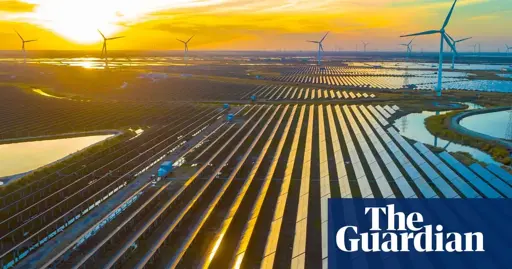- cross-posted to:
- [email protected]
- cross-posted to:
- [email protected]
Summary
Chinese solar companies, which control over 80% of the global solar market, have long avoided U.S. duties by shifting production to Southeast Asia.
Over 80% of U.S. solar imports now come from nations like Malaysia and Vietnam, but new U.S. tariffs are expanding to these regions.
In response, Chinese firms are exploring manufacturing in the Middle East.
Analysts say such measures expose the challenges of reducing U.S. reliance on China’s solar supply chain.
and when broke uneducated magas start complaining that the thing they used to get at walmart for $10 is now $25, they’ll be told to blame the mexicans, and that’s exactly what they’ll do
win-win
The maga peeps that say sanctions against Russia don’t work and then turn around to sanction themselves.
Move some manufacturing to Africa, maybe? Seems like that would be in-line with China’s goals, and would bring some much needed industry and jobs. (I can’t believe I’m rooting for China right now)
This is a funny thing in that I actually like the idea of tariffs but using democracy, human rights, median income, and such for each country. Countries that pay to little and are non demorcratic and don’t allow for various rights would have big tarriffs and ones with all those things would have like zero. So zero for europe and canada and such but very large ones for saudi arabia and such.
Countries that pay to little and are non demorcratic and don’t allow for various rights would have big tarriffs and ones with all those things would have like zero.
Medium ones for the US, got it!
honestly I think the us should have higher tariffs till we get rid of citizens united and bust up monopolies (including limiting ownership of critical things like media) and make healthcare a right and regulate pollution properly and such.
In practice, authoritarian countries that you’re friendly with are treated as honorary democracies, and democracies you have a spat with become honorary dictatorships.
This only gets passed on to the consumer though, it needs to be some kind of tax incentive for companies.
If it becomes more expensive to buy products manufactured in certain countries then customers would naturally change their buying habits to other companies. The price to the customer ultimately acts as an incentive to companies.
This only works if there is enough supply from those other companies. This also assumes that the other companies have a supply chain that isn’t affected by tariffs. Which means each step on the chain needs to produce enough to be a reasonable alternative to tariffed imports.
True, but even if there’s only one supplier, there’s still demand-side elasticity of price, which means that price increasing causes some customers to not buy the product. Thus, a company may or may not be able to increase a price 1:1 with the tarriff.
All this is fun economic theory, but I was specifically responding to the claim that tax incentives were better than a tarriff. They both translate into some increase in cost of the goods sold.
It passes on to both producers and consumers. It’s not perfect but it might be made to work enough.
So China is able to turn the tariffs around to impact US businesses more than Chinese.
China will relocate consumer-ready production to other nations to avoid the price hike of the tariffs. The Chinese-manufactured textiles, plastics, and components used in domestic products will still be impacted by the tariffs, resulting in increased cost of domestically produced products using Chinese materials.
I work in ecomm and our factory had been exploring Mexico but settled on Vietnam, they’re in the process of moving key people over there now. I imagine most others are doing similar, tariffs were bad enough as is.
Okay great but also fuck you government officials because Going solar was a pain in the ass paperwork wise but I ordered my approved Chinese branded panels and they have been running for like 5 years already that was break even according to my calculations for my mom’s house. Now if I am going to be doing the same there’s more hoops? C’mon! No wonder solarization is moving too slow.
I did 3 kilowatts install for my mom and it took me and my brother 2 days to get it done. Easy peasy. Too much worry about not…not getting a profit out of my pocket. I spent only ~5000 not including my labor, my bro and some bits and pieces from homeless depo.
So…it obvs doesn’t directly impact / punish China like they’re trying to say it would, right?
But is the idea that U.S companies would be incentivized to move manufacturing elsewhere? (Like domestically? HAHAHA YEAH RIGHT anyway…)
Guys should I be using my limited income to upgrade my equipment now before everything is like 30% hiked? :(
(No I’m not an expert in globo-economics)





